Amsterdam-headquartered Bynder has been acquired by Boston-based private equity firm Thomas H. Lee Partners (THL). Ahead of this deal, the Dutch company had raised $22.2M in Series A round from Insight Partners in 2016 and emerged leader in the global digital asset management (DAM) market.
As part of this deal, THL will acquire Insight Partners’ stake in Bynder. While terms of the deal were not disclosed, Insider reports the transaction values Bynder at $600M and $350M of that investment will be used to buy out Insight’s stake in the company. Bynder expects the transaction to close early next year.
An integrated DAM platform
Bynder operates a platform that makes it easier for Fortune 500 companies to manage their digital assets such as photos, videos, and other promotional materials across platforms and teams. It counts companies such as Spotify, Puma, Icelandair, and Five Guys, among its customers.
Co-founded by Chris Hall and Roland Keijzer in 2013, Bynder has grown to become a scalable, cloud-native platform supporting companies transform the creation, management, and distribution of their marketing assets.

Hall says the company has $100M in recurring annual revenue and 1.7 million users across nearly 4,000 brands worldwide. “With the announcement of this new partnership, we can deliver even more value to our current and future customers,” Hall says in a statement.
The acquisition of Bynder by THL comes after the Dutch company appointed DAM industry veteran Bob Hickey as Chief Executive Officer in March this year. According to Insider, Hickey began conversations about an acquisition with THL shortly after taking over leadership of the company.
“Today’s announcement will accelerate our growth through product innovation and continued investment in our partner ecosystem, enabling us to scale with our customers and help even more brands deliver exceptional content experiences,” adds Hickey.
A growth market
According to IDC, the digital asset management software market is expected to grow at a CAGR of 11.4 per cent from 2020 to 2025. “The need to create, manage, and deliver rich, immersive, and dynamic media to the many channels through which customers want to interact today continues to fuel investment in this market,” says Marci Maddox, research director for Digital Experience Strategies at IDC.
Digital Asset Management has now become fundamental for executing digital marketing at scale. A study by Adobe in collaboration with IDC found that 85 per cent of marketers are under pressure to create assets or deliver campaigns more quickly. The marketers also revealed creating 10 times more assets than before to support all customer touchpoints.
In a diverse marketplace spanning multiple customer touchpoints, DAM software makes it easier for marketers to act fast. With Adobe Inc. emerging as a competitor in this growing space, Bynder’s acquisition will add to THL’s portfolio of SaaS products that enable sales, marketing, and commerce.
“We’ve devoted considerable time and resources to understanding the technology needs of marketing and sales organisations,” says Jim Carlisle, managing director at THL and head of both Technology & Business Solutions and the THL Automation Fund. “We’re excited to apply that experience to support Bynder in helping its customers grow their businesses.”
No major changes
Cliff Longley, managing director at THL, does not see any major changes in day to day operations of Bynder. The PE firm also plans to keep the current management team in place with co-founder Hall continuing to serve on its board.
THL is investing through its flagship Fund IX and Automation Fund, a segment in the PE industry dedicated to automation-related businesses. The acquisition comes at a time when private equity deal-making has slowed from previous years due to economic slowdown.
The buyout also adds a feather to Amsterdam‘s fledgling startup ecosystem that has minted many unicorns and built companies in new-age fields like data management, robotics, AI, and other transversal technologies.










01
From telecom veteran to Dutch Startup Visa success: The Jignesh Dave story